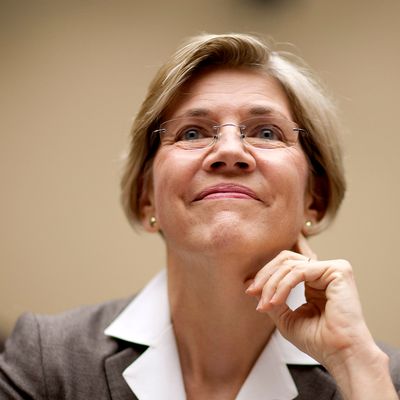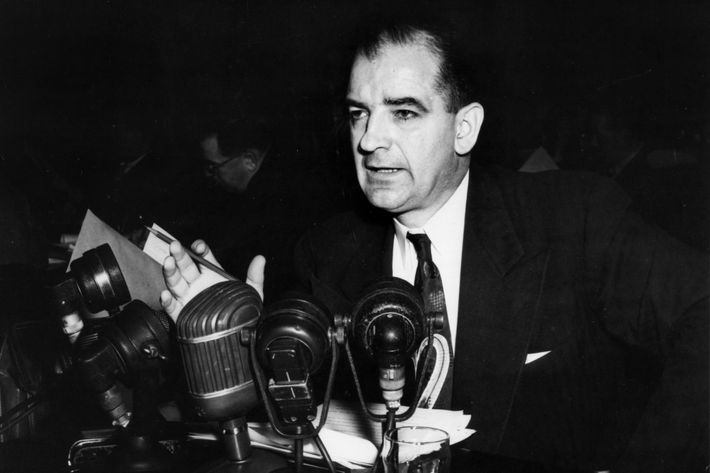
President Obama’s second term has been under way for nearly a year now, so the time has come for a full-blown Struggle for the Soul of the Democratic Party, pitting unruly McGovernite hippies against smarmy Corporate Shill-o-crats. The conflict could be dated as far back as William Jennings Bryan, but the current outbreak seems to have begun with an op-ed in Monday’s Wall Street Journal by Jon Cowan and Jim Kessler of Third Way, a think tank of sorts dedicated to warning Democrats away from economic populism. The op-ed, with the unsurprising headline “Economic Populism Is a Dead End for Democrats,” argues … well, you know.
The completely predictable op-ed set in motion a series of semi-comic events. First, Mike Allen, inspired by Cowan and Kessler’s message, or possibly sniffing a potential new paid advertiser, used his influential tip sheet to call the op-ed a “Game Change.” Third Way and Allen excitedly retweeted mutual endorsements:
Then things started getting real. Warren passive-aggressively struck back by writing a letter to major Wall Street banks asking that they disclose their donations to think tanks. She didn’t name any particular think tanks, but the implication was obvious, and made explicit by liberal critics. Then this morning, Ben White, author of Politico’s financial tip sheet Morning Money, led off with a lengthy quote from an anonymous Republican depicting Warren as a paranoid smear artist:
The Warren letter was a mistake for a number of reasons. First, there is absolutely no evidence beyond feverish conspiracy talk that the banks asked Third Way to write an op-ed critical of Warren. Accusing the banks with no evidence puts Warren in the company of Larouche-like quacks. Second, attacking think tank donors makes Warren look like an opponent of a robust stream of idea development and discussion. This is, to say the least, an odd place for a former Harvard Law School professor to be, and will make even the taciturn pundits at AEI and Brookings very uncomfortable.
Third, Warren’s ‘give me the names’ edict, sounds uncomfortably like the kind of demand that Joe McCarthy would have made in the 1950s.
Yes, Warren is a combination of Joe McCarthy and Lyndon LaRouche, because she asked Wall Street to voluntarily disclose some donations. This is just like the time Joe McCarthy asked the Communist Party to voluntarily disclose its Soviet agents working in government and then sold a bunch of crazy newsletters on street corners.

The skirmish has settled comfortably into well-worn grooves, somewhat obscuring the actual points of conflict. A few points are worth noting. First, Third Way’s Matt Bennett told me the group agrees with Warren that corporations should disclose their donations. That is, Warren’s allegedly McCarthyite/LaRouchian “Have you no shame?” conspiracy-mongering is also Third Way’s position. Second, per Bennett, Third Way receives less than one percent of its funding from financial institutions. But he conceded that its board of trustees is heavily represented by Wall Street veterans who donated personal funds earned through the financial sector.
Third, the op-ed by Cowan and Kessler overlooked the primary source of ideological distinction between Third Way and Warren: financial regulation. Warren’s most potent issue is her support for more stringent financial regulation that would dramatically shrink the role of the financial sector. Third Way supports financial regulation like Dodd-Frank, but is not cool with breaking up the big banks. If you browse the group’s “Capital Markets Initiative,” or, in particular, its primer, “Why Capital Markets Matter,” you come away with a clear sense of a group pushing back firmly against anti–Wall Street populism.
The primer is divided into sections “The Good,” “The Complex,” and “The Ugly.” (The normal word used in the middle here – bad – was presumably rejected as excessively downbeat.) The upshot is that, while regulation is needed, a strong (i.e., large and profitable) financial sector benefits each and every one of us:
Capital markets have become this era’s political piñata. They played a starring role in the 2008 economic collapse. And their complexity makes it difficult to understand the value of much of what capital markets do on a daily basis.
But capital markets are essential to a vibrant U.S. economy. If the U.S. is going to restore long-term growth and middle class opportunity, we must retain our status as the global capital markets leader.
This is probably the sharpest and most consequential point of disagreement between the populist and centrist wings of the party. But it’s not the issue Third Way chooses to highlight to support its case that economic populism is a death trap, and for a good reason: because Warren’s stance on this issue is extremely popular.






























